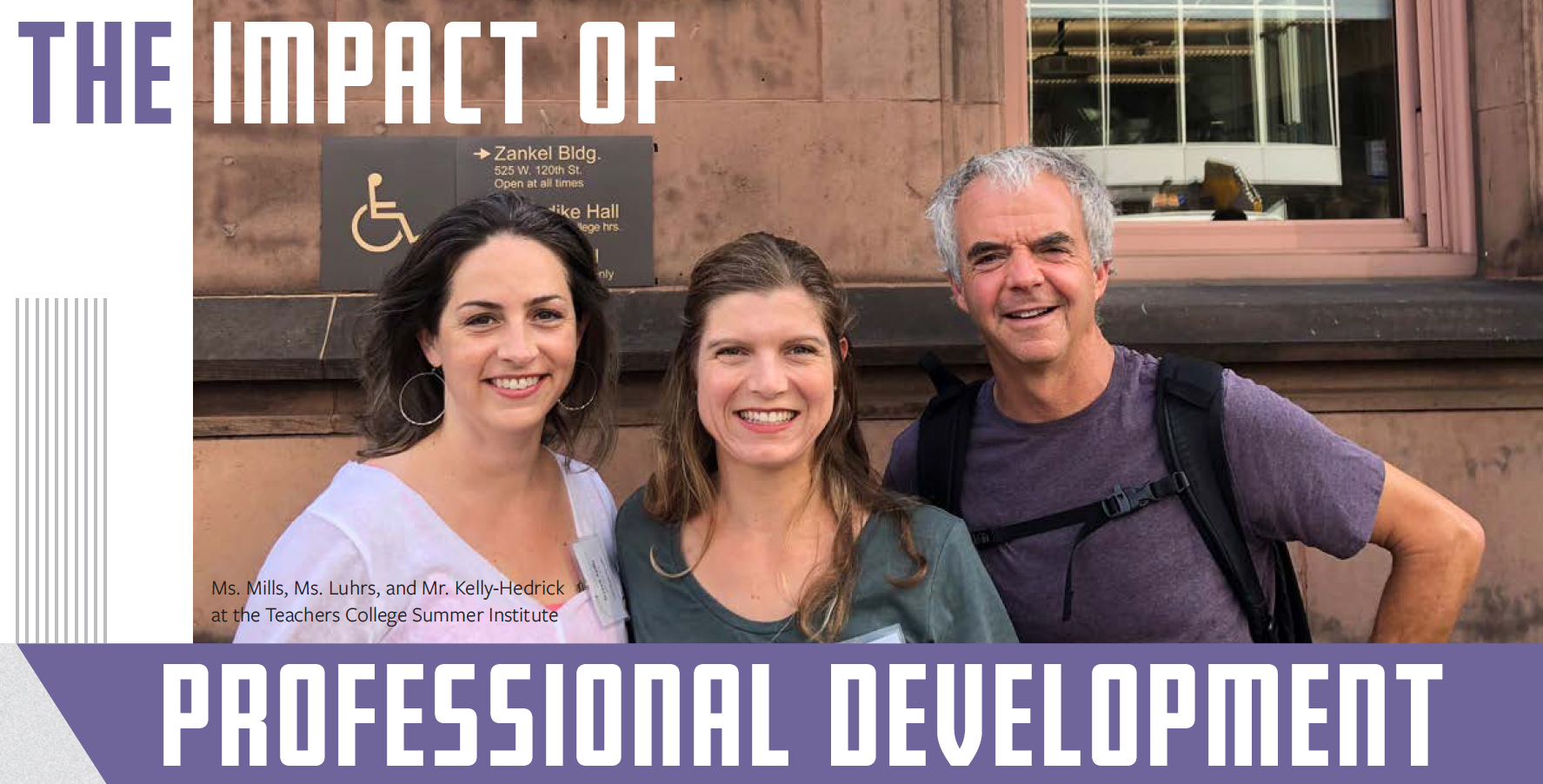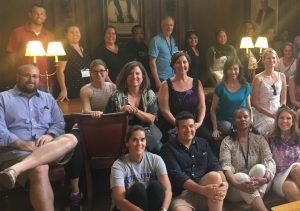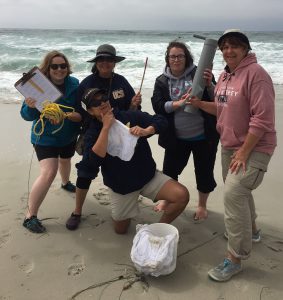
THE IMPACT OF PROFESSIONAL DEVELOPMENT
By Karen Mills , Literary Thinking Faculty
“Sketch a map of a place that is important to you” was the assignment.
Sigh. My first small-group session at the Writing Institute at Columbia University’s Teachers College began with first-day-of-school nerves and anticipation. It was your idea to come here, Karen, my inner voice scolded. Play along. Pick an important place, draw it. It doesn’t have to be perfect. You can think of an important moment. You’ve got ideas. Lots of them.
The blank notebook page sneered up at me and snarkily asked, “But DO you?”
Did I?
The pen slipped in my clammy hands and I felt like I was in middle school all over again. Surreptitiously glancing around the room, I just knew that everyone else was so much better than I was at teaching, at writing, at learning. Focusing my energy on the page in front of me, I took a deep breath, tried to ignore the glances of my instructor, Dwight McCaulsky, making sure we were all on task, and began to clumsily sketch a map of my important place. I can do this.
Right?

Ms. McLane (middle row, second from left) at Oxford University.
The path to my summer professional development at the Writing Institute was several months in the making. It started in August 2017 when Academic Dean Matt Delaney reminded all faculty members to look for opportunities outside the walls of EPS that could impact our teaching within the walls of EPS. “We’re looking to help faculty further develop their craft, aligning that with overall goals of the school program,” Delaney had said. Through a series of conversations and research that fall, I learned about the work that Teachers College was doing with writing and reading workshops; I listened to presentations from Teachers College educators and read about the impacts they’ve made on English classrooms around the world. I implemented small techniques in my own classes and saw significant improvements in the writing my students produced. I wanted to learn more.
Both Delaney and Terry Macaluso got earfuls about my ideas and agreed that the Writing Institute had the potential to positively impact the EPS Middle School writing curriculum. Among other highlights, the Institute’s website promised instruction on “teaching that fosters independence and a growth mindset in student writers,” creating writing partnerships, and revising strategies for scaffolding writing. So, Allison Luhrs, David Kelly-Hedrick, and I applied to the Writing Institute and at the same time submitted a request for professional development funds through EPS. As soon as Teachers College accepted us into their program, Macaluso and Delaney found the funds necessary to send us to New York City for the week-long institute.
We set up room and board.
We arranged travel.
We were ready.
•••
My map was of Swifts Bay on Lopez Island. Instructor Dwight gave us about
two minutes to sketch so, minus my minute-long pause of insecurity, I drew for a total of sixty seconds. Nonetheless, the exercise DID generate several story ideas for me, which was the point. Dwight gave us five more minutes to start writing a personal narrative based on the map. I was ready that time and jumped in to writing. Five minutes and three sentences later, Dwight called time. What? No! I’m just getting going. I need more time!
I needed “more time” for the rest of the week. More time to explore my own writing ideas, more time to consider how to integrate writing workshop exercises into my own classroom curriculum, more time to partner with Allison and David to scope out how each lesson might affect the entire EPS Middle School English program. The hands-on activities in our small group sessions prepped us for the lectures in our large group sessions, which then led to “choice” sessions; at the end of each eight-hour day, our brains were full of writing strategies to share with our students.

Ms. Dodd (back row, left) and Ms. Hollingshead (back row, second from right) at the Project-Based Science Teacher Institute
One benefit of such an immersive professional development opportunity was that we COULD talk over ideas outside of our “school day.” At the café on the corner of Lexington and 118th during a lunch break, Allison, David, and I brainstormed how we might incorporate our small-group lessons into our own classes at EPS. As we descended the worn stone stairs through Morningside Park after school each day, we reviewed conversations we had with middle school English teachers from all over the world about how they used the workshop model. Over dinner at a Harlem restaurant, we shared even more experiences from our days. None of us had families to prep meals for, pets to walk, students to email, lessons to plan. While monthly Program Development Days during the school year serve an important purpose—such as integrating across disciplines for single projects—I found that being removed from my daily routines and responsibilities, combined with the depth of immersion in a topic that I treasured, to be more inspirational to my craft than most other kinds of professional development I’ve experienced.
By the end of our week at Teachers College, I had gained a year’s worth of learning about writing tools, techniques, and strategies. I had also completed a short personal narrative, which wasn’t even close to what I had started with, having nothing to do with my black lab running circles around me on the low-tide sand at Swifts Bay. But it was something that I had created, a piece of writing that was based off an activity that I wanted to share with and replicate for students in my classroom. As I wrote my narrative, attended sessions, and worked with writing teachers from around the world, I had practiced stretching my growth mindset, writing in partnerships, and scaffolding writing strategies—all the things I was so curious to learn about in the first place. I found some personal success and, most importantly, ideas that I hope my students will embrace as they stretch themselves to become independent and thoughtful writers.
As the 2018-2019 school year begins and Allison, David, and I implement techniques we learned at the Writing Institute, we know that we face trials, errors, repetition, lots of deep breaths, and significant buy-in from our capable students and colleagues. Our enthusiasm for and confidence in the workshop model, though, will sustain us through the process. The time and space carved out for us with this professional development opportunity makes it all possible.
A FEW FACULTY PROFESSIONAL DEVELOPMENT OPPORTUNITIES FROM SUMMER 2018
| KATIE DODD & SARAH HOLLINGSHEAD
Project-Based Science Teacher Institute |
CAITLIN MCLANE
The Gilder Lehrman Institute of American History – Teaching Seminar: The Age of Lincoln |
| DAVID KELLY-HEDRICK, ALLISON LUHRS, KAREN MILLS
TC (Teachers College) Summer Institute – Writing |
DANA ALBU, DAVID FIERCE, ELENA OLSEN
Wilderness First Aid Training |
| BESS MCKINNEY
Klingenstein Summer Institute |
BESS MCKINNEY, ELENA OLSEN
Courage of Care Advanced Training |
| TED SCOTT
QuarkNet |
DANA ALBU & MOLLY LORI
TPRS (Teaching Proficiency through Reading & Storytelling) Books Language Instruction Workshop |

